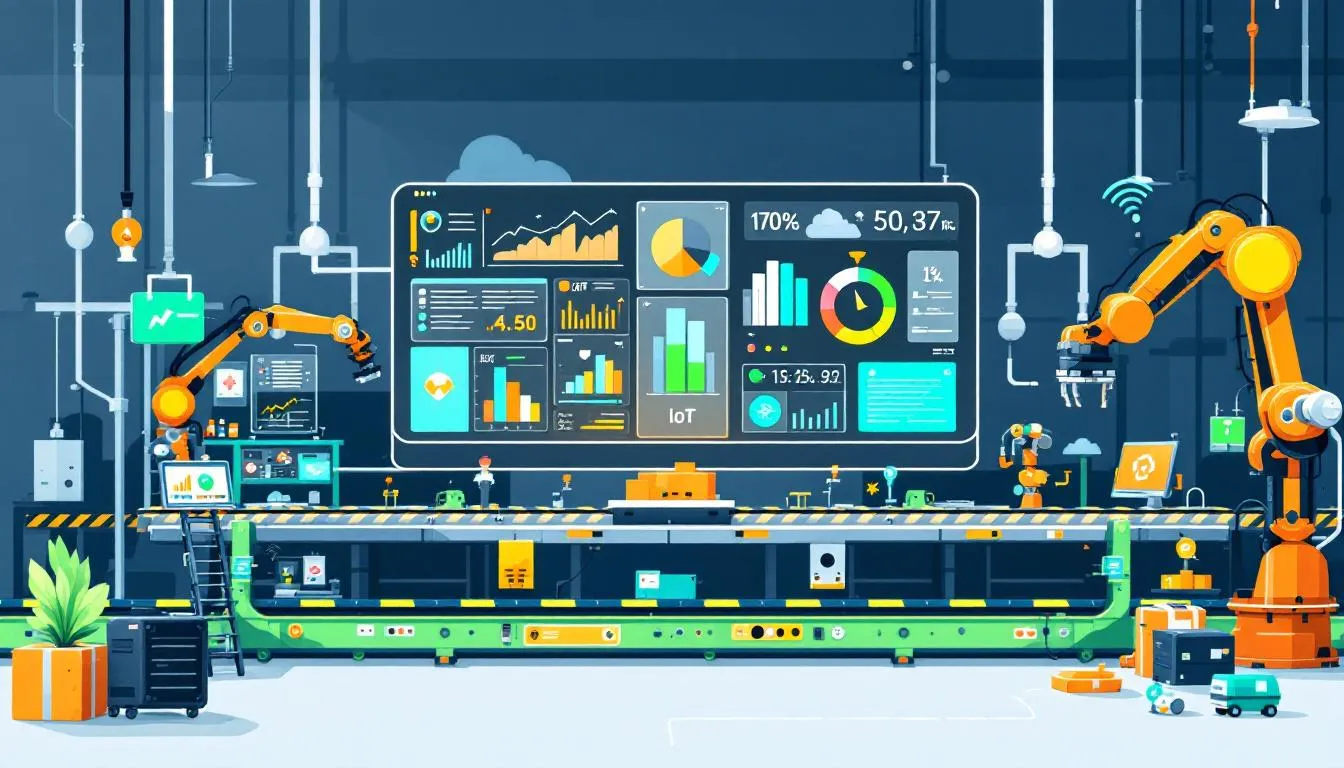Top AI Use Cases in Manufacturing: Enhancing Efficiency and Innovation
Introduction to AI in Manufacturing Use Cases
AI in manufacturing refers to the use of artificial intelligence technologies to improve various aspects of the manufacturing process. This can include optimizing production schedules, predictive maintenance, quality control, and supply chain management.
By leveraging AI, manufacturers can enhance efficiency, reduce costs, and improve product quality. Read this guide on establishing a strong foundation for AI in manufacturing for more insights.
How AI Is Reshaping Smart Manufacturing Industries (7 Examples)
AI in the Automotive Manufacturing Industry
In automotive manufacturing AI is a game changer. It’s used for complex tasks like welding SUV frames with precision. This means highest quality and big cost savings. AI’s role is also in inspection processes through image recognition, making quality control inspections faster and more accurate. AI solutions brings precision, efficiency and cost savings in automotive manufacturing by automating tasks, recommending next best actions and optimizing order fulfillment processes.
AI in the Vehicle Manufacturing Industry
In next gen vehicle production AI, IoT and robotics are creating eco friendly and efficient manufacturing. Generative AI is playing a crucial role in innovating design and production processes by generating new ideas and solutions. This industry showcases streamlined operations, AI based quality assurance and automated maintenance solutions, a big leap in automotive manufacturing. AI is playing a key role in manufacturing operations, optimizing and automating performance optimization, paperwork automation, continuous operations, maintenance tasks, defect detection and inspection in next gen vehicle manufacturing.
AI in the Food and Beverage Manufacturing Industry
In food and beverage industry machine learning is changing demand forecasting. AI is being used to analyze data to improve forecasting by looking at consumer trends to identify patterns and behavior. Improved forecasting means better coordination between marketing, sales and supply chain management, less lost sales and overall more efficient. Additionally, AI can optimize manufacturing processes, enhancing forecasting and coordination between marketing, sales, and supply chain management.
AI in the Aerospace Manufacturing Industry
In aerospace manufacturing AI is key for predictive maintenance and quality control. Monitoring critical machine sensor data means no resource wastage. AI powered defect detection is also playing a key role in increasing production efficiency, reducing lead times, minimizing parts shortages and helping to improve quality control by automating defect identification which is changing process optimization.
AI in the Semiconductor Manufacturing Industry
In semiconductor manufacturing AI has been game changing. Thousands of AI models have been deployed and productivity has increased, yields have improved and big financial gains have been made, proving the power of AI in high tech manufacturing. It’s the machine learning algorithms that underpin these AI models that analyze huge amounts of data to optimize production, quality control and decision making which is driving the big productivity and yield improvements.
AI in the Tire Manufacturing Industry
In tire manufacturing and across all manufacturing companies AI driven systems are setting new standards in quality and consistency. This has improved manufacturing uniformity big time, proving AI can improve product quality and change the way companies manufacture.
Electronics Manufacturing Industry
In electronics manufacturing AI/ML powered defect detection systems are making a big impact in production. These innovations have improved product yield and operational efficiency by improving accuracy, flexibility and overall performance of manufacturing operations, a big leap in this high demand industry.
The Role of MOM Software in AI-Driven Manufacturing
In the landscape of AI-powered manufacturing, Manufacturing Operations Management (MOM) software plays a vital role in bridging the gap between AI technologies and seamless operational execution. MOM software serves as the backbone of modern manufacturing facilities by integrating AI capabilities to optimize processes, improve efficiency, and reduce waste.
How MOM Software Supports AI in Manufacturing
-
Real-Time Data Integration:
MOM software collects and analyzes real-time data from machines, sensors, and AI systems, allowing manufacturers to make data-driven decisions and respond proactively to production challenges. -
Predictive Maintenance Integration:
When paired with AI, MOM software can predict machine failures before they happen. By analyzing sensor data and historical trends, MOM enables timely maintenance, reducing downtime and improving operational efficiency. -
Production Scheduling and Planning:
AI-powered MOM software optimizes production schedules by analyzing demand forecasts, resource availability, and operational constraints, ensuring streamlined workflows and reduced delays. -
Quality Management:
MOM software integrates AI-powered inspection tools, including computer vision and defect detection systems, to ensure high-quality standards throughout the production process. -
Supply Chain Visibility:
AI algorithms within MOM software improve supply chain coordination, helping manufacturers forecast demand accurately, manage inventory levels, and avoid overproduction or stockouts. -
Adaptive Manufacturing Processes:
MOM software enables manufacturers to quickly adjust to variability in demand, production capacity, and material availability, ensuring adaptability in dynamic market conditions.
MOM Software Use Case Example in AI Manufacturing
Imagine an electronics manufacturing facility using MOM software integrated with AI. Real-time production data is fed into the MOM system, which detects a potential bottleneck in the assembly line. AI-powered insights suggest reallocating resources to prevent delays, while predictive maintenance algorithms flag a machine showing early signs of failure. Meanwhile, the AI-driven inspection system ensures every circuit board meets quality standards before leaving the production floor.
Why MOM Software is Essential for AI Integration
-
Seamless collaboration between AI systems and human operators
-
Centralized control and visibility across manufacturing processes
-
Improved resource utilization and reduced waste
-
Enhanced operational flexibility and resilience
-
Faster adoption of AI technologies across manufacturing workflows
Incorporating MOM software alongside AI technologies ensures a robust digital infrastructure, empowering manufacturers to achieve smarter, more efficient, and future-ready operations.
By combining AI capabilities with MOM software, manufacturers can unlock a new level of precision, efficiency, and adaptability—key drivers for success in an era of smart manufacturing.
How many manufacturing companies are using AI?
In 2024, 35% of global companies use AI, and 42% are exploring it. Over 50% plan to incorporate AI technologies this year. This means more than 77% of companies are engaged with AI. Out of 333.34 million companies worldwide, over 250 million are using or exploring AI.
Source: Exploding Topics
If you want to stay up-to-date with the latest insights on Industry 4.0 and the transformative impact of smart manufacturing technologies on the future of manufacturing, simply scroll down and subscribe to our news and updates. We're here to keep you informed and inspired!
FAQs
What is AI in Manufacturing?
AI in manufacturing means using artificial intelligence technologies to improve various aspects of the manufacturing process. This can include production scheduling, predictive maintenance, quality control and supply chain management. By using AI manufacturers can make it more efficient, cost effective and product quality better.
How does AI improve Quality Control in Manufacturing?
AI improves quality control by using machine learning and computer vision to inspect products for defects. AI systems can analyze images and sensor data to detect flaws that human inspectors may miss. This means consistent product quality and less defective products.
Can AI be used in Production?
Yes AI can be used in production. AI can optimize production by:
-
Automating repetitive tasks: AI powered robots and systems do repetitive and time consuming tasks, human workers can focus on more complex tasks.
-
Production scheduling: AI algorithms analyze multiple factors to create production schedules, reduce downtime and improve workflow.
-
Process control: AI monitors and adjusts production parameters in real time to ensure product quality and minimize waste.
Share this
You May Also Like
These Related Stories

Industrial-Grade AI: Transforming Operational Efficiency

Top 7 IoT Use Cases in Manufacturing for 2025


.png?width=654&height=374&name=AI%20in%20the%20Automotive%20Manufacturing%20Industry%20(689%20x%20394%20px).png)


No Comments Yet
Let us know what you think